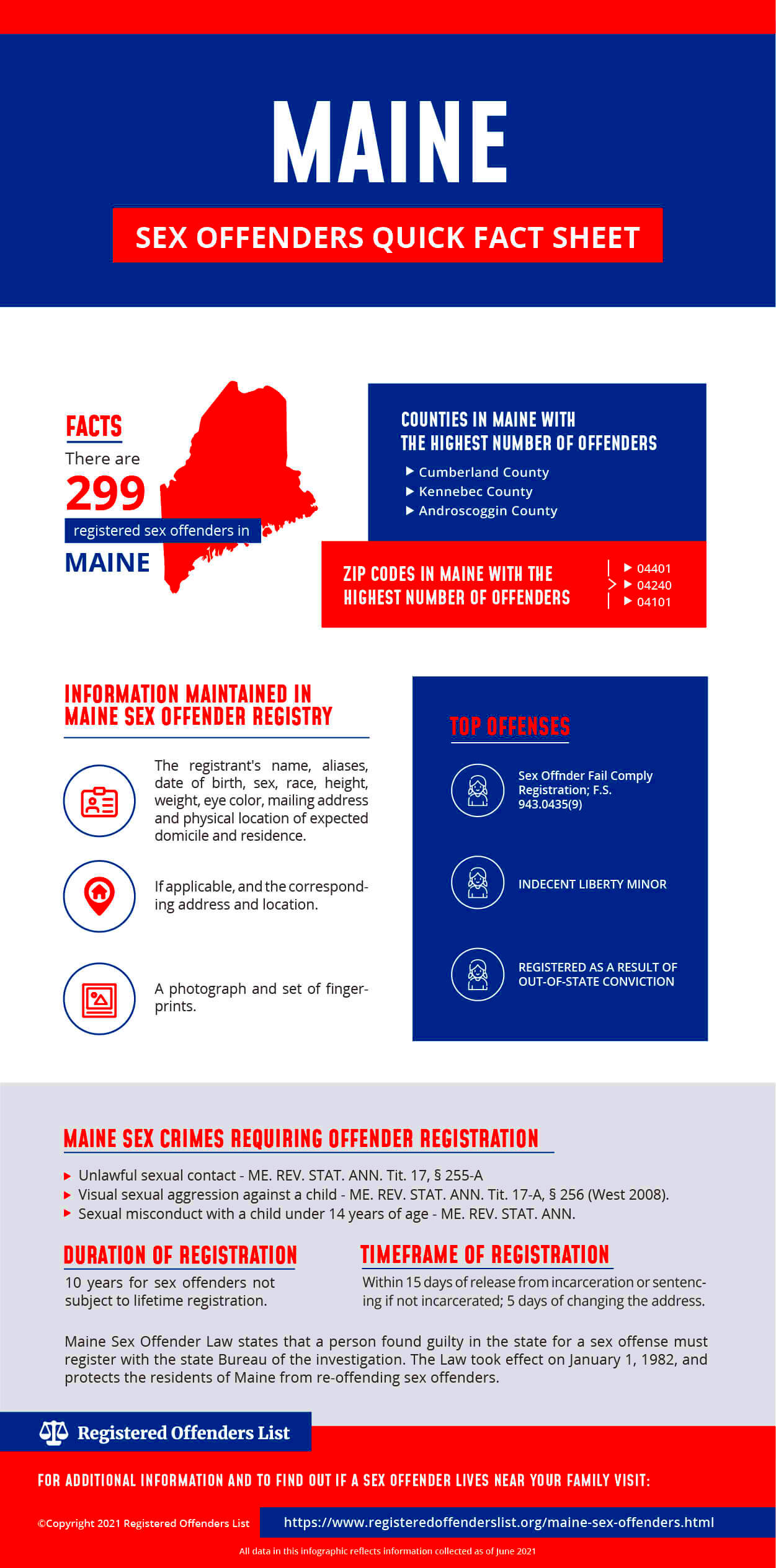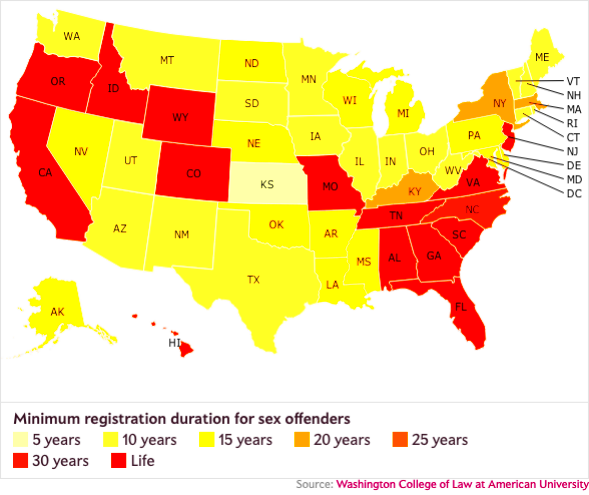Maine Sex Offender Laws Explained
Maine has laws in place regarding offenders that aim to safeguard the community while also respecting the rights of individuals found guilty of sexual offenses. Understanding these laws can be challenging but it’s essential for anyone involved or affected to be aware of their details. The purpose of these laws is to keep the public informed and ensure that individuals convicted of sexual offenses are supervised appropriately. It’s important for both legal experts and those impacted by these laws to comprehend aspects such as registration requirements and the various offender tiers.
Who Needs to Register as a Sex Offender?

In Maine not everyone who commits a sexual offense will have to sign up as a sex offender. Usually registration is required for people found guilty of specific kinds of sexual crimes. Here’s a rundown of who has to register.
- Felony Sex Offenses: Those convicted of felony-level sexual offenses, such as rape or sexual assault, must register.
- Crimes Against Minors: Offenders who commit crimes involving minors, including child pornography and statutory rape, are required to register.
- Repeat Offenders: Individuals with multiple sexual offenses are subject to registration.
It’s worth mentioning that even if an offense doesn’t automatically warrant registration a judge has the discretion to impose it during sentencing. Based on what I’ve observed many people are taken aback to discover that just one offense can result in a lifetime of registration if it fits certain criteria.
Registration Requirements and Duration

When someone has to sign up as a sex offender in Maine there are important rules and timeframes to keep in mind. Lets go through the details.
- Initial Registration: The convicted individual must register with the Maine State Bureau of Identification. This includes providing personal details, fingerprints, and a recent photograph.
- Periodic Updates: Offenders are required to update their information regularly. This includes any changes in address, employment, or vehicle information.
- Duration of Registration: The duration varies based on the offense:
- Tier I: Usually, offenders are required to register for 10 years.
- Tier II: Offenders must register for 25 years.
- Tier III: This is a lifetime registration.
Through my conversations with people impacted by these regulations I’ve witnessed the profound effects that the length and conditions of these laws can have on their lives. Keeping up with updates and ensuring an accurate registry can be challenging yet they are essential for adhering to the rules. This facet of Maines sex offender legislation highlights the continuous dedication needed from individuals on the registry and their loved ones.
Different Tiers of Sex Offenders

In Maine sex offenders are classified into tiers, each with its own set of requirements and consequences. Knowing these tiers is crucial to understanding how the law addresses different offenses and the ongoing responsibilities of those found guilty. I’ve noticed that the tier system can be quite complex but it’s important for both lawyers and those impacted by the law to have a clear understanding of these differences.
Maines tier system is categorized into three primary tiers or levels.
- Tier I: This tier includes individuals who have committed less severe offenses. The registration period for Tier I offenders typically lasts 10 years. While the offenses might be serious, the law considers the risk to the public as lower compared to higher tiers.
- Tier II: Offenders in this tier have committed more serious offenses or have a history of repeated offenses. They are required to register for 25 years. The law views these individuals as posing a higher risk, hence the extended registration period.
- Tier III: This tier is reserved for the most severe cases. Offenders are required to register for life. These are typically individuals who have committed heinous crimes or have shown a pattern of serious offenses. The lifetime registration reflects the high risk associated with these offenders.
From what I’ve seen grasping these levels is essential for anyone dealing with the legal system or assisting someone impacted by these regulations. Each level brings its own duties and societal consequences that can deeply affect lives.
Legal Consequences for Non-Compliance

Not adhering to the sex offender registration rules in Maine can result in severe legal repercussions. The authorities view non-compliance as a matter, as it goes against the purpose of the registration system, which is to safeguard the community. In my opinion facing these consequences can be extremely challenging and transformative for those affected.
Failing to comply with the registration rules can lead to the following repercussions.
- Criminal Charges: Non-compliance can lead to criminal charges, which may result in fines or additional prison time. This can significantly impact an individual’s future and exacerbate their legal troubles.
- Extended Registration: In some cases, failure to comply can lead to an extension of the registration period. This means more years on the registry and additional scrutiny.
- Impact on Employment and Housing: Being on the registry already affects job prospects and housing opportunities. Non-compliance can further complicate these aspects, making it even more challenging to rebuild one’s life.
Based on what I’ve seen firsthand the pressure and consequences of not complying can be significant. Its wise to stick to the registration rules and consult a lawyer if there’s any doubt.
How to Challenge a Registration Requirement
Challenging the requirement to register as a sex offender in Maine can be a process that takes a toll on ones emotions. However it is sometimes essential for individuals who feel they have been wrongly classified or burdened by the registration laws. Having witnessed many people navigate this obstacle I empathize with how overwhelming it can be. Nevertheless there are options to pursue in order to find relief.
If you want to contest a registration requirement, here are some steps you can follow.
- Seek Legal Advice: The first step is to consult with a knowledgeable attorney who specializes in sex offender laws. They can provide guidance based on your specific situation and help you navigate the legal system.
- File a Motion: You may need to file a motion in court to challenge the registration requirement. This could involve arguing that the registration requirement is excessive given the nature of the offense or presenting evidence of rehabilitation.
- Present Evidence: Gather and present evidence that supports your case. This could include proof of rehabilitation, character references, or evidence that challenges the accuracy of the initial registration decision.
- Attend Hearings: Be prepared to attend court hearings and present your case before a judge. It’s crucial to be well-prepared and have all necessary documentation and evidence at hand.
I think the journey can be time consuming and tough but with the assistance and readiness you can improve your chances of a better result. Knowing your rights and the legal choices at your disposal is crucial for navigating this challenging path.
Resources and Support for Those Affected
Dealing with the difficulties of being a registered sex offender can be a challenging experience not only for the individuals involved but also for their loved ones. Throughout the years I have witnessed how important it is for people in these circumstances to seek support and access resources that can aid them during these challenging moments. The right kind of support can have an impact providing direction, empathy and practical help.
Here are some helpful resources and support choices you can access.
- Legal Aid Services: Organizations like the Maine Volunteer Lawyers Project offer free or low-cost legal assistance. These services can help with navigating the complexities of sex offender laws and ensure that individuals understand their rights and obligations.
- Counseling and Support Groups: Emotional support is equally important. Counseling services and support groups provide a space for individuals and their families to discuss their experiences, share coping strategies, and find emotional relief. The Maine Psychological Association can be a good starting point for finding qualified therapists.
- Rehabilitation Programs: Programs focused on rehabilitation can help offenders reintegrate into society. These may include job training, educational opportunities, and other programs designed to support personal growth and reduce recidivism.
- Community Organizations: Local organizations and nonprofits often offer various forms of support, from housing assistance to job placement services. Connecting with these organizations can provide practical help and reduce the stigma associated with being on the registry.
Based on what I’ve seen getting the right assistance can make a difference for people impacted by these situations. It’s not solely about fulfilling obligations but also about helping individuals rebuild their lives and discover a way, ahead. When the community offers support and empathy it can turn the overwhelming task of dealing with these regulations into a more manageable experience.
Recent Changes and Updates in Maine Law
Laws regarding offenders are not fixed they change over time based on new legal rulings and shifts in societal views. Its important to stay informed about recent developments in these laws if you are directly impacted by them because changes can affect registration requirements and legal responsibilities. In my experience keeping up with these updates can be challenging akin to chasing after a train but it is vital, for ensuring adherence to the law and knowing your rights.
Here are some recent modifications and updates to the laws regarding sex offenders in Maine.
- Enhanced Monitoring: Maine has introduced stricter monitoring requirements for higher-tier offenders. This includes more frequent check-ins and updates to ensure accurate information.
- Revised Tier Classification: Recent amendments have updated how offenses are classified into different tiers. This change aims to better reflect the risk posed by offenders based on their crimes and history.
- Reentry Programs: New initiatives focus on improving reentry programs for offenders. These programs aim to support successful reintegration into society by providing resources and reducing the likelihood of reoffending.
- Public Access to Information: Changes have also been made to the public access provisions. Adjustments in how information is shared can impact the level of public awareness and the accessibility of offender data.
These changes have the potential to impact not only those listed on the registry but also the wider community. Staying up to date with these developments is crucial for adjusting to new obligations and grasping the legal framework. Based on my own experiences staying informed can be an asset in dealing with these challenging matters.
Frequently Asked Questions
Comprehending the intricacies of Maines sex offender regulations can prove to be quite a task for many individuals who often have questions regarding the implications of these laws on their lives. Throughout my experiences I have encountered a range of inquiries that highlight the worries and doubts of those impacted, by these legal provisions. Below are some commonly asked questions that may shed light on the matter.
- What happens if I move to a new address? You are required to notify the Maine State Bureau of Identification within a specific timeframe of moving. Failure to do so can result in legal consequences.
- Can my registration period be reduced? In some cases, you may apply for a reduction in the registration period, especially if you have demonstrated significant rehabilitation. This process often requires a legal petition and evidence of positive changes.
- How can I access my own registration information? You can request access to your registration information through the Maine State Bureau of Identification. This can help you ensure that all details are accurate and up-to-date.
- What support is available for families of registered sex offenders? Families can access various support services, including counseling and support groups. These resources are designed to help families cope with the emotional and practical challenges they face.
By tackling these inquiries we can alleviate worries and offer insight to individuals dealing with the intricacies of sex offender legislation. If you have concerns or require tailored assistance seeking counsel is always a wise approach. Based on my observations possessing information is crucial for navigating these legal hurdles smoothly.
Conclusion
Navigating the intricacies of Maines sex offender laws can be overwhelming, with its share of complexities and emotional hurdles. Its essential for anyone impacted by these regulations to grasp the various tiers, registration obligations and legal repercussions. Through my personal experiences and observations, I have come to realize the significance of staying updated and seeking appropriate assistance. Whether you are facing registration concerns aiming to contest requirements or simply looking for resources, keep in mind that you dont have to go through this journey alone. There are support channels available and strategies to cope with the effects of these laws. Being proactive, well informed and seeking professional advice can greatly enhance your ability to navigate these legal challenges, successfully.


